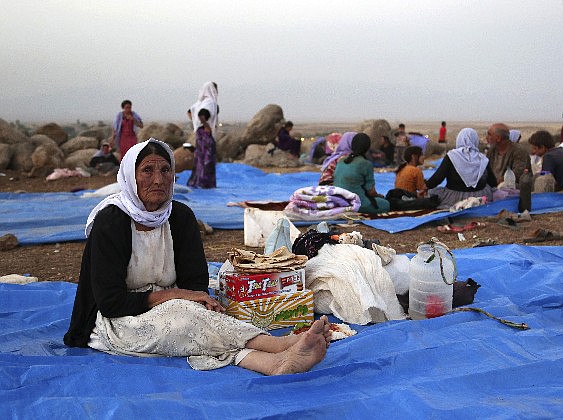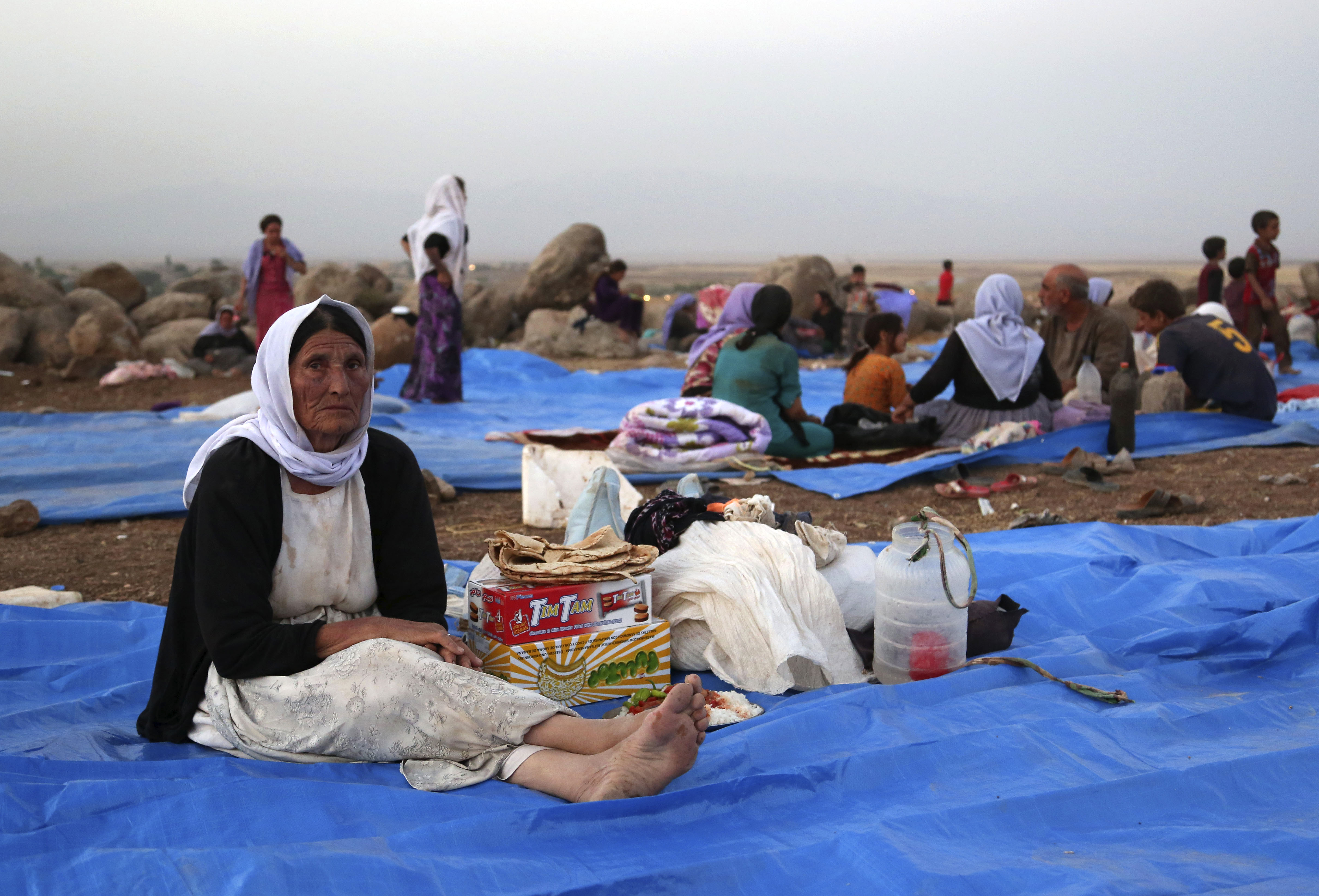SEMALKA, Syria - Trucks and jeeps trundled slowly across the pontoon bridge, packed with refugees, with children poking their dusty heads out of the windows and truck beds. Nearby, a distraught father frantically scanned them as they passed, hoping to catch sight of his missing son.
Beside him, a young man searched for his sister, who he fears was snatched by extremists.
Unknown numbers, perhaps hundreds, of men, women and children went missing in the chaos as tens of thousands of Iraqis from the Yazidi religious minority fled in a panic from marauding militants, then spent a week hidden in a barren mountain range before finally making their way into neighboring Syria. The loss of loved ones adds even more suffering to people who spent days stranded in the Sinjar mountains under a blazing son with barely any food or water.
Some of the missing may have been gunned down by militants during the escape. Others were lost as families scattered in panic under gunfire from extremists chasing them into the mountains. Dizzy from thirst, some adults lost track of children in the crowds in the mountains. Some women may have been abducted by militants, and Iraqi and U.S. officials say they believe hundreds of women are being held captive by the radical Islamic State group.
"There are many missing, many," said Naji Khano, who lost his 17-year-old son Sherwan as he fled gunmen.
At the Semalka crossing, crowds of Yazidis made their way back from Syria on Sunday and Monday into the relative safety of Iraq's autonomous Kurdish region in the north. Trucks, jeeps and cars full of Yezidis inched across a pontoon bridge over the Tigris River, which forms the border here. Hundreds of other refugees milled among them on foot, some barefoot, lips cracked from thirst, clutching water bottles, watermelons and flat bread loaves distributed by aid workers.
Some men walked into the Tigris river to cool off; mothers bathed their children. One woman walked weeping; a boy held her hand. Most said they had not eaten in days.
And many searched for their missing relatives among the crowds. There was no way of knowing how many were missing with the situation still in flux. But over the course of one hour on Sunday, at least a dozen Yazidis said they had lost family members whose fates are now unknown.
"My sister is missing," 22-year-old Amer Qassem said as he walked among the crowds.
Qassem said he and dozens of his extended family fled their village of Tel Qassab the night of Aug. 2 when they heard fighters from the Islamic State group were approaching. The militants consider Yazidis as heretics. As the sun rose, militants riding a jeep mounted with a machine-gun spotted them, and opened fire.
"We ran everywhere, we were terrified. We lost each other," Qassem said. The jeep zoomed away. As the extended family regrouped, they realized some women -- maybe 10 -- were missing.
"My sister Amira was one of them," he said. "My father is a broken man now, he does not know what to do if something will happen to her."
Two other men earlier told The AP they saw militants round up women at a checkpoint as they shot the men in two different villages.
Like others fleeing Yazidi-majority villages in the area, Qassem's family scrambled up the nearby Sinjar mountains, a 60-kilometer (40-mile) range that the Yazidis consider a holy site. There they remained for days, until Kurdish Syrian fighters battled the militants to clear a path for the Yazidis to escape into nearby Syria. Once there, they walked or hitched rides further north to Semalka to cross into Iraq's Kurdish-controlled areas.
Dakhil Atuseld lost his sister-in-law Wadha and his aunt Laila as they fled the village of Siba under fire from militants.
"They disappeared," he said. "We were for six days in the mountains without food and water, how could we know what happened to them?"
The confusion of fleeing under fire was so great that Hanash Hamo can't even say for sure who was last holding his 3-year-old daughter, Jalila. Now the girl has vanished, along with two others of his children, Suad and Azad, he said, showing their identification cards.
Another man, Hussein Haji, said he had lost contact with over 25 relatives in the village of Solakh. He showed pictures of them on his phone - baby Sam, dressed in pink swaddling clothes, missing alongside his mother; Nashwan, a teenage boy; and Alina, a smiling girl, also missing along with her mother.
"Can you find my children?" asked another elderly man, Hashem Saleh, when he saw a crowd gather around a reporter. His daughters, 12 and 15 years old, and two sons, 24 and 14, were gone, lost as the crowds descended from the mountain through a desert valley toward the Syrian border.
"Who can help me find them?" Saleh pleaded, his white baggy pants, shirt and droopy moustache caked brown with dirt.
Others tried to reassure him that his children probably hitched rides and were probably already in a camp for the displaced in northern Iraq. But he insisted he would not leave the border crossing until he found them. By evening, he was nowhere to be seen; there was no way of knowing if he found his family.

